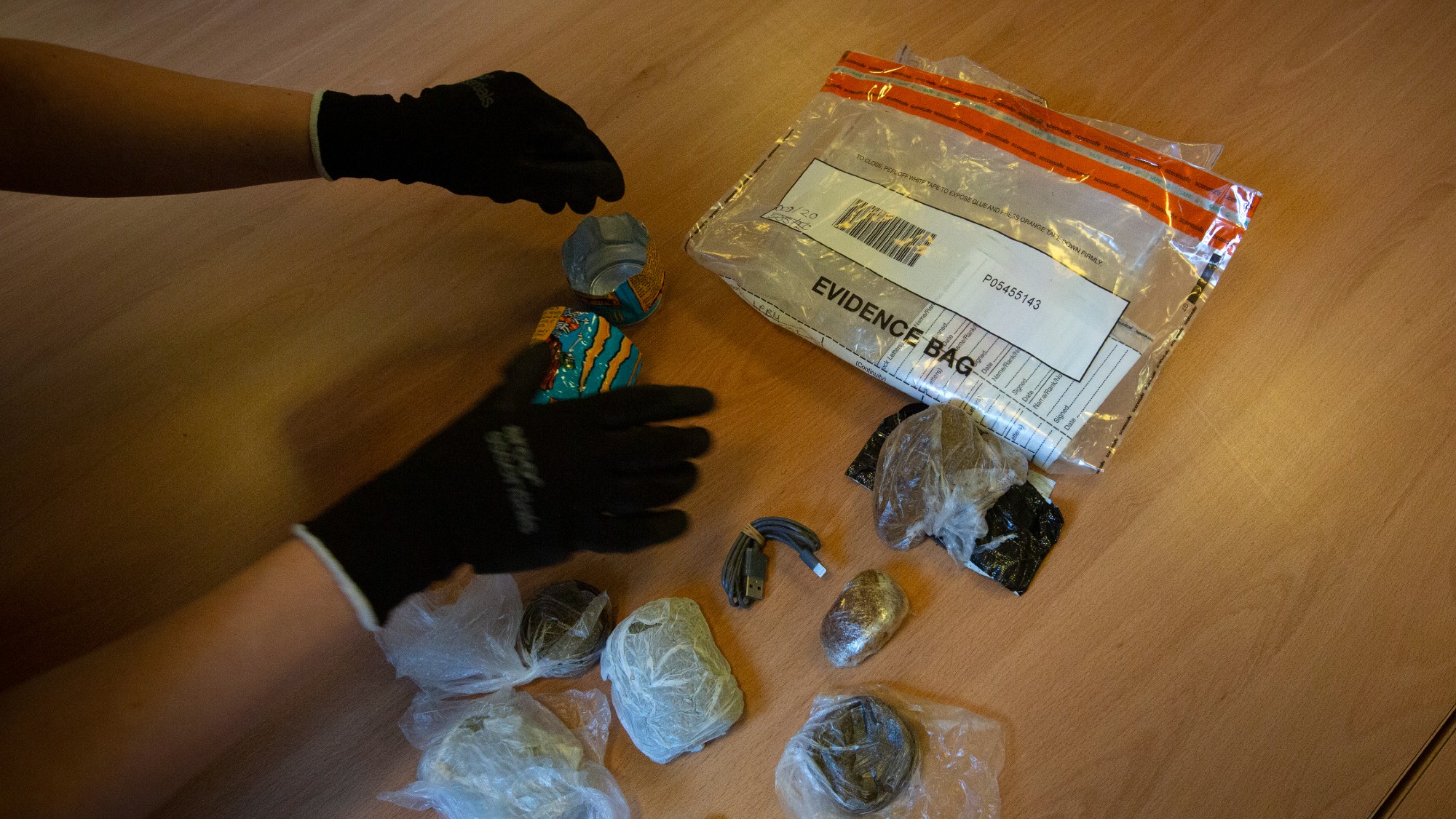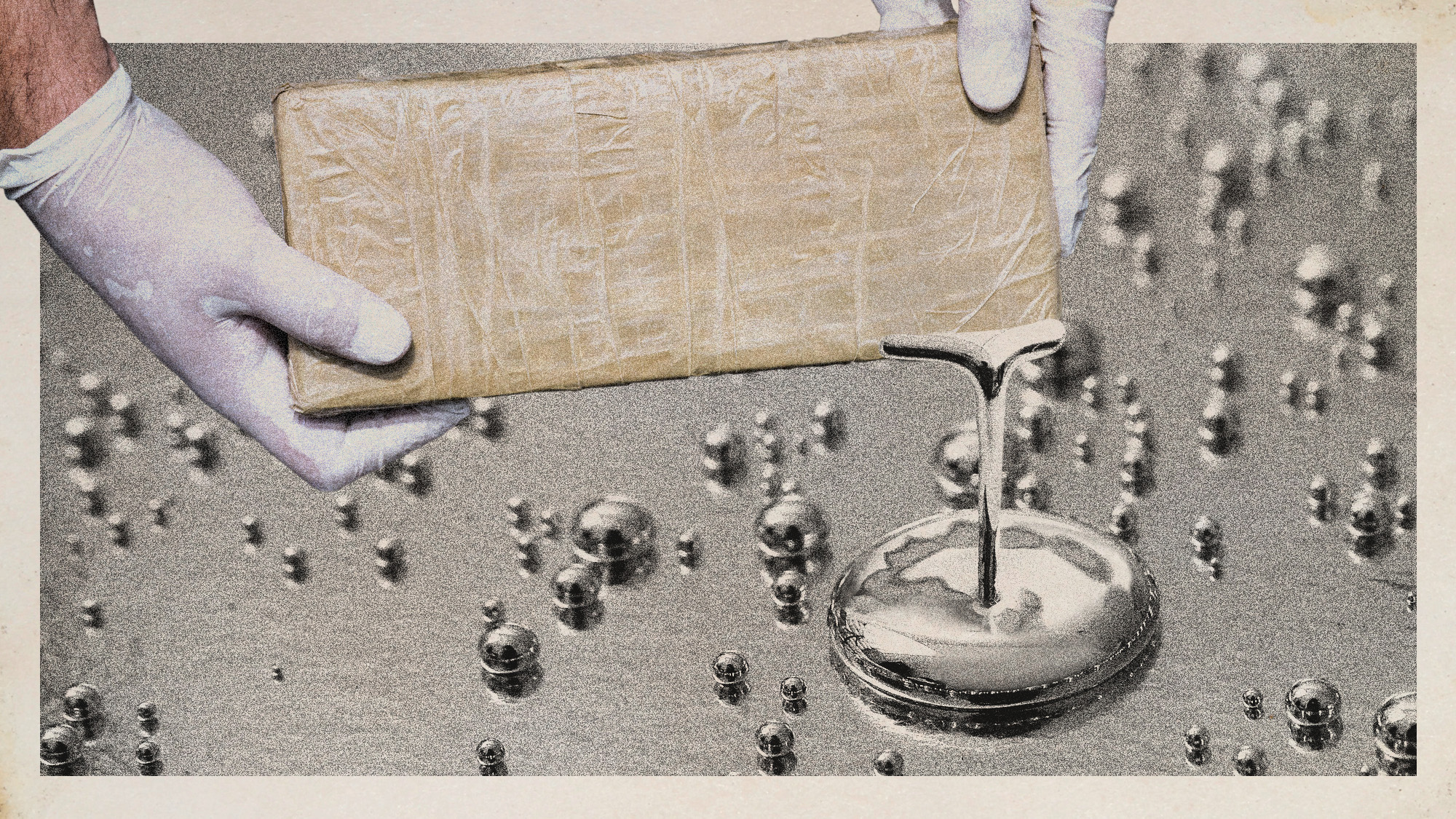How drugs became ‘endemic’ in UK prisons
Buzzing drones drop drugs into prisons ‘like a pack of wasps’ as drug-related deaths spike behind bars

A free daily email with the biggest news stories of the day – and the best features from TheWeek.com
You are now subscribed
Your newsletter sign-up was successful
The drugs crisis in English and Welsh prisons has reached “endemic” levels, “fostering a dangerous culture of acceptance that must be broken”, said the House of Commons Justice Committee.
The prison service’s ability to maintain control, keep prisoners safe and offer them “effective rehabilitation”, is being “critically undermined” by the sheer scale of the “trade and use of illicit drugs”, the cross-party parliamentary committee said in a report. Without “urgent reform”, there could be “unacceptable human cost”.
How much of a problem is it?
Almost four out of 10 inmates surveyed by His Majesty’s Inspectorate of Prisons said it is easy to access drugs. Some prisons have an “embedded” subculture of drug use, with a “menu of drugs” on offer, and inmates saying it’s “almost impossible to get away from them”. In 2023-24, 30% of women and 23% of men in the prison estate reported having a drug issue.
There were 136 drug-related deaths in English and Welsh prisons between December 2022 and 2024 – 16% of the 833 deaths during that period across the prison estate. The number of drug-related medical emergencies are so high, it can cause “regime restrictions” and more time spent in cells. Over half of prison staff say they have been exposed to psychoactive substances, reporting subsequent nausea, confusion and paranoia.
The Week
Escape your echo chamber. Get the facts behind the news, plus analysis from multiple perspectives.

Sign up for The Week's Free Newsletters
From our morning news briefing to a weekly Good News Newsletter, get the best of The Week delivered directly to your inbox.
From our morning news briefing to a weekly Good News Newsletter, get the best of The Week delivered directly to your inbox.
How are drugs getting into prisons?
“Beyond the razor wire and towering walls” of Britain’s jails, a “hidden criminal underworld is thriving”, said The Sun, as “ruthless gangs” are “running multimillion-pound drug empires” from their cells.
Illicit substances, ordered by prisoners with “encrypted phones”, are smuggled in by visitors or corrupt staff, thrown over prison walls or, increasingly, delivered by drone. A man living near a prison in Worcestershire told Sky News that drones are dropping so many packages into the jail, there’s “an intense buzzing, like a pack of wasps”. In the 12 months to March 2025, there were 1,712 drone incidents in prisons, a 43% increase on the previous year, and a new peak.
How is the crisis affecting inmates?
Each morning, staff open the cell doors and I’m waiting “for the check to be completed successfully, as that means everybody’s alive”, the governor of HMP Shotts in Scotland told The Times. Shotts is at “the front line of the synthetic drug crisis in the UK”, said the paper, which means overdoses are a significant risk. It is also difficult to know how many prisoners are using these synthetic drugs, as current drug testing systems fail to detect them.
A recent inspection of HMP Leeds found it has highest rate of prisoner suicides of all UK jails, with “illicit drug use and availability” identified as a major factor. Leeds had the highest number of “drug equipment finds” in the prison estate, and 18% of inmates said they had developed a drug or alcohol problem while at the jail.
A free daily email with the biggest news stories of the day – and the best features from TheWeek.com
What can be done about it?
The Justice Committee has called on the Ministry of Justice to update drug testing methods, address the growing use of synthetic drugs in prisons, and speed up plans for waste-water surveillance systems that can help monitor drug usage trends.
The committee has also recommended that the government invests in electronic drone countermeasures, such as the “Sky Fence” system that can disrupt drone signals.
In July, the MOJ announced a new £900,000 investment to tackle the drones bringing drugs and weapons into prisons, in addition to the £40 million already allocated for improving security measures, including reinforcing windows and putting up anti-drone netting.
Chas Newkey-Burden has been part of The Week Digital team for more than a decade and a journalist for 25 years, starting out on the irreverent football weekly 90 Minutes, before moving to lifestyle magazines Loaded and Attitude. He was a columnist for The Big Issue and landed a world exclusive with David Beckham that became the weekly magazine’s bestselling issue. He now writes regularly for The Guardian, The Telegraph, The Independent, Metro, FourFourTwo and the i new site. He is also the author of a number of non-fiction books.
-
 Political cartoons for February 15
Political cartoons for February 15Cartoons Sunday's political cartoons include political ventriloquism, Europe in the middle, and more
-
 The broken water companies failing England and Wales
The broken water companies failing England and WalesExplainer With rising bills, deteriorating river health and a lack of investment, regulators face an uphill battle to stabilise the industry
-
 A thrilling foodie city in northern Japan
A thrilling foodie city in northern JapanThe Week Recommends The food scene here is ‘unspoilt’ and ‘fun’
-
 Mexico’s forced disappearances
Mexico’s forced disappearancesUnder the Radar 130,000 people missing as 20-year war on drugs leaves ‘the country’s landscape ever more blood-soaked’
-
 Illicit mercury is poisoning the Amazon
Illicit mercury is poisoning the AmazonUnder the Radar 'Essential' to illegal gold mining, toxic mercury is being trafficked across Latin America, 'fuelling violence' and 'environmental devastation'
-
 Thailand is rolling back on its legal cannabis empire
Thailand is rolling back on its legal cannabis empireUnder the Radar Government restricts cannabis use to medical purposes only and threatens to re-criminalise altogether, sparking fears for the $1 billion industry
-
 Insects and sewer water: the alleged conditions at 'Alligator Alcatraz'
Insects and sewer water: the alleged conditions at 'Alligator Alcatraz'The Explainer Hundreds of immigrants with no criminal charges in the United States are being held at the Florida facility
-
 Why Rikers Island will no longer be under New York City's control
Why Rikers Island will no longer be under New York City's controlThe Explainer A 'remediation manager' has been appointed to run the infamous jail
-
 Narco subs are helping to fuel a global cocaine surge
Narco subs are helping to fuel a global cocaine surgeThe Explainer Drug smugglers are increasingly relying on underwater travel to hide from law enforcement
-
 Alcatraz: America's most infamous prison
Alcatraz: America's most infamous prisonThe Explainer Donald Trump wants to re-open notorious 'escape-proof' jail for 'most ruthless and violent prisoners' in the US
-
 Mexico extradites 29 cartel figures amid US tariff threat
Mexico extradites 29 cartel figures amid US tariff threatSpeed Read The extradited suspects include Rafael Caro Quintero, long sought after killing a US narcotics agent